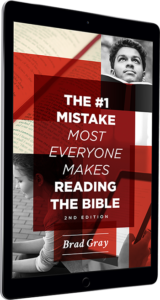Episode 044 – Genealogy Christmas Pt 1: Son of David
Key Passage(s): Matthew 1:1-17
If you were tasked with retelling the most significant story in human history, how would you begin? Matthew had to ask the same question, and what was his answer? A genealogy. Seriously? Could there be anything more boring than that? We normally skip right over them. And yet, what Matthew does with Jesus’s genealogy is electrifying! The jaws of the first century audience would’ve been on the ground. And over the next four weeks, we’re going to explore this “Genealogy Christmas” and begin where Matthew begins – with Jesus being a “Son of David.” The implications are astounding, and I trust Christmas will take on deeper meaning for you this Advent Season!
Discussion Questions
- What was your biggest takeaway from the teaching?
- What are you specifically waiting for and/or longing for this Christmas season? Have you shared this with God? Have you invited anyone to join you in praying for this with you this month?
- Where do you feel like God is “running late?” How are you responding to this?
- In this teaching, we were reminded God doesn’t make mistakes. As you acknowledge this truth in your life, do you need to make adjustments in your perspective of your circumstances, relationships, or self?
- Where do you need to relax your plans and trust God and His timing anew this Advent season?
- How will you begin walking this out this week?
For Further Study
Hagah The Text – this is a longer teaching (sermon) that goes into greater detail about the concepts explored in Teaching Series Episode 020





I think you miss spoke and said David interpreters the dream. It was a scripture in Daniel. You may just want to correct it. Good teaching, thank you
You are correct, Cathy! I did misspeak there in the video. And since we do the whole teaching in one take, I didn’t feel it was necessary to redo the whole thing because of that minor error. But thank you for letting me know.
This spoke to my heart and encouraged me so much today!
I’m grateful God met you in that way, Carrie!
This may be my favorite video yet Brad. Your understanding and explanations make it clear even to an old guy like me. Thank you again. Blessings.
So great to hear, Steven. Thanks for sharing that!
Brad thank you. My heart is so excited and full of God from this video. I am forever grateful that I am graphed in to His genealogy.
It’s utterly astounding!
But all of NT is approached w/o Jewish background thus we lose what is really there and how it is tied to Jewish concepts..
If we take a funnel and view it horizontally we see enormity of the historical Jewish background in Matthews mind that the KJ and all others do not expose,cause it’ would be too Jewish.
When we read the story of Noah being called a righteous one, it’s the genealogy given before that, showing that Noah had not cross bred with the Nephelim thus righteous.
Good stuff Brad!
I’v heard it this way:
Jesus/YASHUA-the Salvation of YEHOVAH
THROUGH Christ-The ANOINTED ONE —when he comes-Jesus did not fulfill that at this time.
So THE SALVATION OF YEHOVAH THROUGH HIS ANOINTED ONE AT THE RIGHT TIME. Is not this what all Jews saw and heard when hearing this name this way?
Yep, we’ve gotta keep seeing the Jewish background in what we read in the Bible. That context is HUGE.
😳🤯👏🏻 WOW! I am so grateful for WTT and the richness it gives to my faith and daily existence.
(Btw, I did not mean for this to post off this particular thread. My intentions were for a general post.)
Thanks for your encouragement Claire!
I love the beauty of how God so intentionally, intricately designed the giving of His Word so that we can see the depth of His love for us and the wonder of who He is. Life-giving and gets my heart racing! Thanks for a great start to the Advent season!
It is amazing indeed, Lynette.
I am stuck on the aspect of Matthew leaving out names to make the 14…I know you mentioned western thinking versus eastern thinking, the significance of the 14 is completely lost on me if it was contrived…do eastern thinkers not care about altering reality to make a point? Seems like I need to understand this better, I’m sure there is more my western mind needs to grasp. Thanks Brad for any dewesternization you can offer! 🙂
I wonder this, too. Also, why is Matthew’s geaneology different from Luke’s? Does Luke not leave out those names? What is the significance of that?
Great comments, Chris. Thank you for asking your questions. Jewish genealogies hardly ever depict a literal straight line of history (hence, don’t look at genealogies through our western understanding). Genealogies did 3 things … 1. showed identity and duty, 2. demonstrated credentials for power and property, and 3. structured history to indicate one’s character. So when Matthew structures and highlights history in these “14” generation blocks, he’s doing so to structure Israel’s history around David, and show how Jesus is the fulfillment of Israel’s story and the promises made to David. The genealogy legitimizes Jesus’ identity and mission in the minds of an eastern audience who would understand exactly what Matthew was doing since they viewed genealogies that way (in terms of the 3 things above). And it was typical to leave people out of a genealogy in order to serve the larger purpose the writer was seeking to convey.
Is that helpful?
Hey Brad,
What is driving my question is the statement that scripture is inerrant and God breathed… if the genealogies are altered to make the authors’s point, it presents a conflict and I wonder how contextual scholars respond to those that say the Bible is without fault…. thanks brad for the help in this.
Hey Chris, thank you for inquiring about this. Many of the issues around inerrancy and being God-breathed stem from our Western perspective of what is “correct” with respect to the Bible. Editing genealogies (i.e. leaving people out as Matthew did) was totally normal and acceptable to the people in the ancient world. We look at it and think, “Well, that’s not literal and thus problematic,” but that’s us imposing our 21st century literalist understandings and definitions onto a time period that didn’t think or operate that way. So it’s important we don’t impose upon the Bible what the Bible doesn’t impose upon itself. As you know, this creates a lot of tension because we have to deconstruct our Traditions in order to get back to the Text and seek to understand what the Bible is doing. If you’re interested in exploring more of this, shoot me an email and I’ll recommend some resources. Thanks!
This was a powerful episode for me. Thank you so much, Brad! Your final point is what connected deeply with me – God is never early. God is never later. He is always on time. I’ve been wrestling with this very idea recently due to circumstances in my life. I tend to want to jump in and make things happen in my speed. A great reminder that our amazing God is fully worthy of my ultimate trust!
Absolutely, Brenda. Thanks for sharing.
What an in depth culture and language. It’s interesting numerical values are practiced in the language.
One thing comes to mind in response to “God is always on time”; is it possible to cause a delay or change/modification to His plans due to our own misguided actions or inaction most notably on a personal level?
I believe that irrespective of our decisions, God’s never thrown off course. He’s aware of the decisions we’ll make and uses our decisions (good or bad) to further the purpose He’s set forth. So His plan is never thwarted. But I’ll also believe we delay ourselves from experiencing certain things because of our misguided actions or inactions.